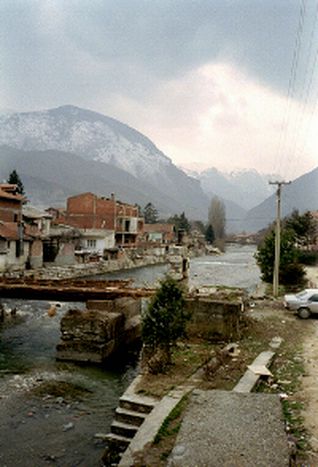
Walking naked into a mosque: nationalism in Kosovo
Published on
What is kosovar national identity? Migjen Kelmendi, editor of the weekly Java, opens the debate with a recently published book Who is Kosovar?
The man who started the debate around Kosovar identity, Migjen Kelmendi, editor of weekly Java, takes a satisfied sip of his espresso. It is a rainy afternoon in Pristina, and restaurant Hani is deserted. The first time I met him, in the summer of 1999, he weighed at least twenty pounds less. He still looked pale from the exodus into Macedonia.
Back from exodus
Feverishly, he dictated the story of his escape to me when Serb troops chased the Albanian population from the city. Today, he says: ‘Immediately after the war, when we returned from deportation, I decided this was not the time to remain the ironical, detached intellectual. I became the director of our first own broadcast company – RTK, state tv and radio, taken over from the Serbs. But the obligatory glorification of the great Albanian idea went against my grain. The dream that had motivated us during our parallel life under Serb occupation seemed outdated. But can one change the system from within? I was confronted by this huge machinery and chose to start my own paper, in order to create space for other opinions.’
Kosova is the youngest region in Europe: 70% of the population is under thirty. Each year some 30.000 newcomers enter the ghost market. The country is transfixed by two key issues, Kelmendi writes: independence and unemployment, pamvarësia en papunësia. Java was his solution: a job opportunity for young journalists and a platform for the debate about what it means to be an independent Kosovar.
Opening the debate on Kosovar nationalism
He introduced the question in Java’s first issue, on December 1st, 2001. A fierce debate followed. He collected the main contributions in a book, Who is Kosovar?, which has now appeared in English. Anywhere else in the Balkans I would suspect narrow-minded nationalism to lurk behind such a question. Here, the opposite is the case. ‘If western democracy is the aim of Kosovar society,’ Kelmendi writes, ‘then I think that rather than the taboo of identity, of the unified language, of nationalism, the reference point should be the debate on all these issues, on the solidified Albanian identity, on the common language, on national symbols, on Kosovo’s tomorrow. Not by taking nationalism as the fundamental ideology of state and society, but rather human rights and multi-ethnicity. We articulate this as an extension of the debate that is going on throughout the European community, trying to make people reflect on the supra-ethnic identity.’
His stance was most unpopular. In the years after the war anyone who distanced himself from the reunification with the Albanian motherland was soon to be accused of collaborating with the Serbs. In this book, Valon Murati, a former soldier of the Kosovo Liberation Army (KLA) writes: ‘The goal of the glorious war for liberation waged by the KLA was the unification with Albania. Those who advocate the idea of creating a Kosovar nation work, deliberately or not, for the integration of the protectorate of Kosova in Serbia.’ And what is more, to him the idea of an independent Kosova is contrary to ‘processes of globalization and overall integration’. He states, ‘in a time when traditional boundaries are removed, the fragmentation of a nation in two is more than absurd, is more than conservative, it is totally reactionary.’
Between two camps: Kosovar identity
Kelmendi is caught between the two nationalist camps: the Serbs and the Albanians. Both proclaim the existence of two peoples, who can never have a shared identity. As the frontman of punkband The Traces, Migjen Kelmendi was the first Yugoslav to sing in Albanian and now campaigns for the recognition of Gheg, the northern Albanian dialect that was dismissed by the late Albanian dictator Enver Hoxha. Doesn’t that then make him popular in Kosova, where everyone outside of the parliament and the state media speaks Gheg? The old rocker grins defiantly: ‘It’s like walking into a mosque naked. Standard Albanian enabled our leaders to enter the world as one nation’.
And what about the international community, that has been governing the country since 1999 and is working on the status of Kosova? ‘They have no idea. They lack the sensitivity. I have never met a top official from the United Nations Mission in Kosovo. They were absent at the book launch, with the exception of Yvana Enzler, the Swiss ambassador who financed the translation.’
The international representatives are not the only ones missing. The book that wants Kosova to become a rightful place for all minorities only includes one (Italian-American) woman, no Roma and no Serbs among its contributors. The editor hangs his head: ‘This book documents the failure of Kosova, of the international community and of ourselves. Immediately after the war, we isolated the Serbs and the Roma completely. We haven’t found a way to include them in this debate.’



